The most recent episode of PokerGo’s excellent “High Stakes Duel” series featured a rematch between Tom Dwan and Phil Hellmuth playing heads up for $400,000. With two of the best players in the world, both with excellent records in heads-up matches over their careers, I expected the match to be a master class on heads-up play. But was it?
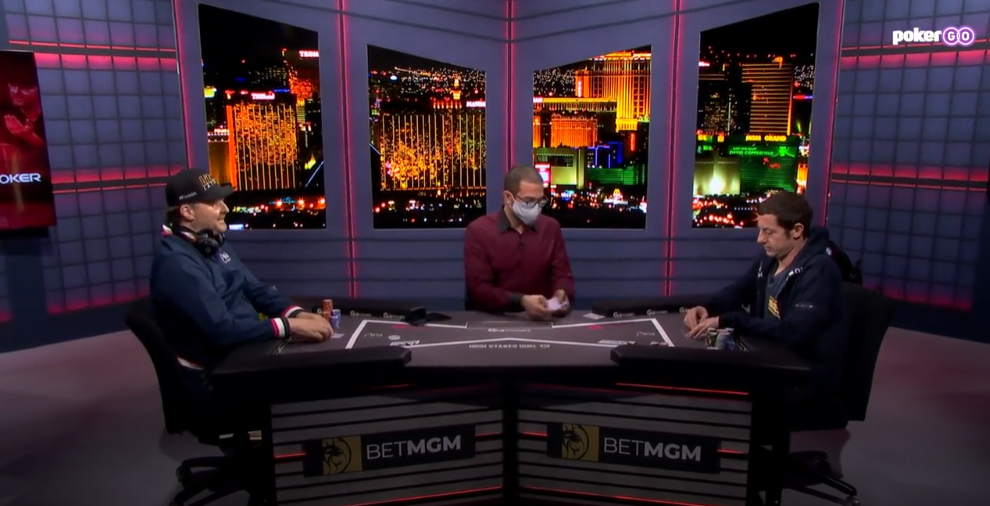
Analyzing hands is never easy with these two. While they both have far too much success to be anything but world-class players, they are also two of the most unique players in terms of style and deviation from standard play. We saw some really interesting hands from these two during this session, so let’s look at one of them to see what we can learn.
A fun hand
Action started off slow for the first few levels, with Hellmuth sticking to his usual cautious style and Dwan dialing back his relentless aggression in favor of a much more restrained approach. The two battled back and forth with no huge pots in the first hour or two. Then, with blinds of $600/$1,200 (no antes), an interesting hand came along.
Hellmuth limped from the button, tossing in $600 to complete the blind with Q♦ 5♦. This isn’t typical heads-up strategy where a solver would nearly always recommend raising here, but there are definitely professional heads-up players who limp the button in some situations.
A serious heads-up specialist will usually only limp the button if their opponent has been very aggressive preflop and they are running into big reraises quite often. If they think they can outplay their opponent post-flop and want to see more flops on the button, limping a significant portion of their hands can be the best way to make this happen.
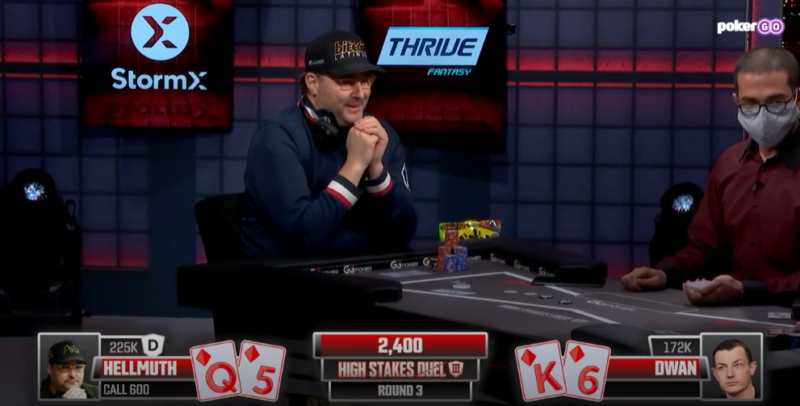
Why did Hellmuth choose to do this? Well, we know that Hellmuth has a very high opinion of himself when it comes to poker. He believes — and he has the bracelets to back it up — that he’s one of the best players in the world. So, he probably believes that he can outplay even a world-class wizard, like Dwan. Hellmuth also has an excellent record in heads-up matches, which would bolster his confidence even higher.
Hellmuth also knows that Dwan is very aggressive; he made his name by being one of the most aggressive players in high-stakes cash games and, while he isn’t the maniac he once was, Dwan is still a fearless player who can raise and reraise at any time with any hand. So, avoiding those three-bets might be another reason for Hellmuth to limp.
Dwan checked his option with K♦ 6♦, which is pretty standard in this spot. Some experts will raise their best and worst playable hands here, while others will always check and take the free flop. And, Dwan knows Hellmuth won’t only limp weak hands that he will fold, so he can’t exploit the limping much, especially with stacks so deep.
A big flop for Dwan
The flop is K♣ K♠ T♣, a great flop for Dwan who makes trip kings. Unfortunately, he’s probably crippled the deck here, and Hellmuth won’t have a strong hand very often in this spot. Dwan checks because betting out is likely to end the hand right now, and he wants to make some more money from Hellmuth. If Dwan had been the preflop raiser, he would bet here because a check would be too obvious. But, he gives nothing away by making the standard check, and would probably check 100% of flops in this spot.
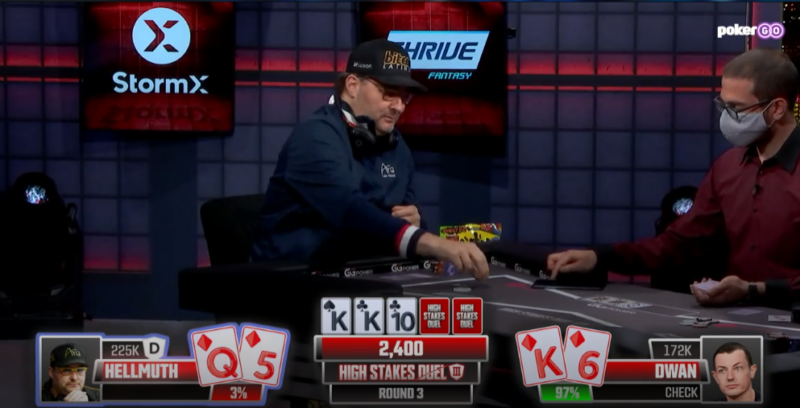
It doesn’t mean much when Hellmuth bets $1,500 on this flop, since he should probably be betting this flop no matter what his hand is. He’s in position and the flop misses Dwan most of the time (not this time of course). Hellmuth bets slightly more than half the pot just hoping to take it down now.
Dwan simply calls, knowing that a check-raise would ring alarm bells for Hellmuth. He’s hoping that Hellmuth has a 10 or a draw and will bet again. Hellmuth hates to play big pots early, so Dwan knows that extracting a small amount of value is probably a better play than raising here and scaring him off.
Hellmuth pairs the turn
The turn is the Q♥, a card Hellmuth loves, but we can see that it’s a potential disaster for him. He has no reason to believe that he’s facing trip kings and could lose a good-sized pot here. Most players would, in fact, lose a big pot to the aggressive Dwan here, but with Hellmuth, you just never know.
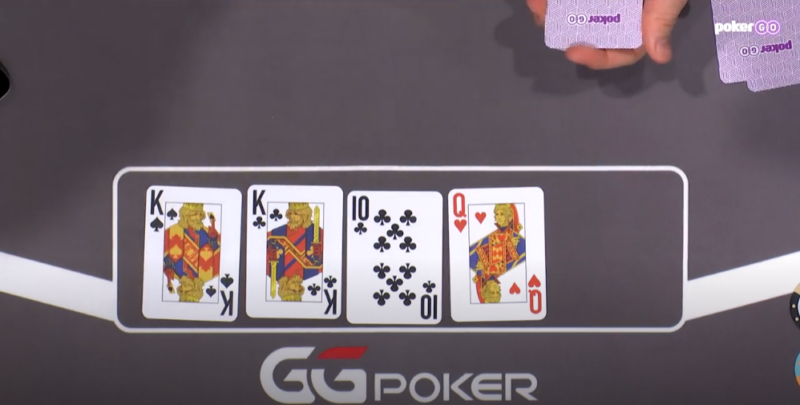
Dwan checks again, and Hellmuth checks behind. At first, this may seem odd since he bet the flop and now his hand is much better. But there are lots of good reasons that Hellmuth might choose to check behind here. Let’s look at how a bet would work against the different portions of Dwan’s range.
Dwan’s Range
A draw
If Dwan has a jack or two clubs, he’s very likely to check-raise the turn and make Hellmuth’s decision a tough one. That will be no fun, and Hellmuth could make a disastrous mistake facing a check-raise here. If Dwan misses the draw, he would likely bluff the river if Hellmuth checks behind on the turn. A turn check-raise may be hard for Hellmuth to call, but a river bet will be an easy call on any river card against an aggressive player like Dwan.
A monster
If Dwan has a king, 10s full, or a queen with a better kicker, Hellmuth is in big trouble. Putting in a bet here would be disastrous, and he might have to call a check-raise against this range because of the possible draws on the board.
A weaker made hand
If Dwan has something less, like a 10, a small pair, or ace-high, he’ll call a river bet most of the time. And, getting two more streets of value is going to be very tough, so waiting for the river might actually make Hellmuth more money. This portion of Dwan’s range is still quite polarized against Hellmuth’s queen; with a lesser holding, there’s very little chance that Dwan will catch up enough to win the pot.
If this was a 9 9 8 5 board, and Hellmuth held 8 2, his hand would be much more vulnerable and we could make a case for a bet here. But, with only one overcard that could fall, Hellmuth’s hand is pretty safe if he’s ahead now.
Absolutely nothing
If Dwan holds nothing, he’s drawing dead and won’t call a bet here. But, if he also misses the river and ends up with no pair and no significant high card value, he may bluff. This gives Hellmuth some chips he can’t get by betting because Dwan will never call a bet.
Sometimes, giving an aggressive player a chance to bet is the only way to get their chips. And, he may catch a pair and pay off a small river bet as well. With a hand like 5 6, Dwan has six outs to make a pair that will likely force him to call another bet from Hellmuth, so checking behind gives Hellmuth six outs to get paid.
When we look at Dwan’s range and how he’ll respond to a bet, checking behind seems like the clearly correct option. I imagine Hellmuth’s thought process was similar.
A wild river changes everything
The river is where this hand gets interesting. The Q♠ looks like a disaster for Hellmuth, giving him the worse full house. He has no reason to believe Dwan has a king here; the hand just hasn’t played out in a way that would indicate Dwan has a monster, and now Hellmuth has a monster of his own. This could be big trouble for the Poker Brat.
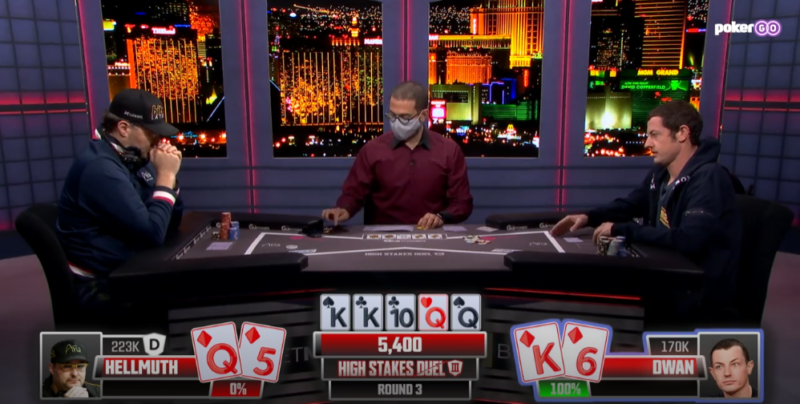
Dwan checks again, knowing that the board is fairly crippled and that he probably won’t get a call from Hellmuth. The limp preflop from the button makes it less likely that Hellmuth has an ace to call with, and the only other hand that isn’t a monster — a 10 — will bet for him. Leading out just doesn’t make sense in a spot like this.
Hellmuth is thinking much the same thing. There aren’t many hands that Dwan can have here, so he bets the minimum — another $1,200 into a pot that’s currently $5,400, just hoping to get a scrap of value on the river.
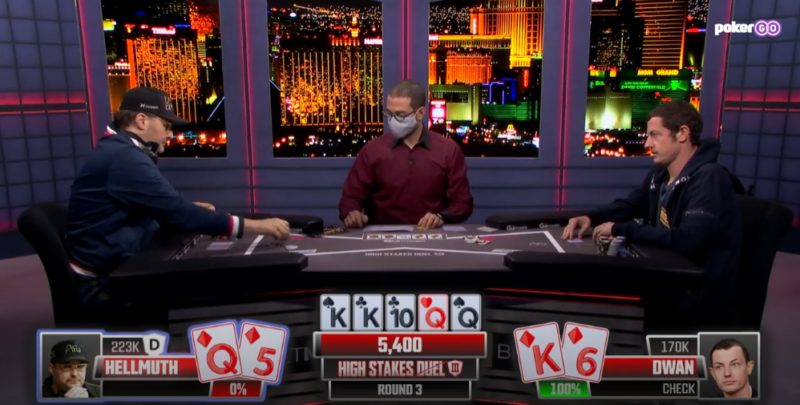
Now, Dwan has to pull the trigger. He can’t wait any longer and, if he raises the minimum, it may look just as obvious as a bigger raise. There’s also the possibility that Hellmuth has a real hand like a straight or a queen and will pay him off on a bigger raise, so he makes it $6,500 total — $5,300 more than Hellmuth’s bet. He’s expecting Hellmuth to fold most of his range, but he knows Hellmuth might find a call with two 10s, a queen, a straight, or even an ace in his hand.
For most of us, this would be an awfully tough spot. The check-raise sure looks scary, but it could be a bluff or a chopped pot. Weaker players will simply call based on the strength of their hand and refuse to fold a full house when they are so rare in hold’em. But Hellmuth is a different kind of player.
He thinks for less than 30 seconds and then calmly slides his cards to the dealer. The commentators, Ali Nejad and Phil Galfond, both strong players themselves, are shocked. He makes it look like such an obvious lay down when almost anyone else in the world would have some real thinking to do before they could even consider such a fold.
How does Hellmuth do it?
The commentators think Hellmuth may have a live read on Dwan, but I don’t think that explains his play.
Hellmuth must have believed he had the best hand or he wouldn’t have bet the river. If he had a very strong tell on Dwan, he would have checked behind, knowing that he would be walking into a check-raise and might be folding a chop.
No, I think Hellmuth thought this one through every step of the way and didn’t have that much work to do on the river.
Against a more predictable player, this fold really isn’t that tough. The hands that a typical player might check-raise for value here include the last queen, either of the two remaining kings, and two of the three remaining 10s. This means that one of the six possible combos is a chop, while Hellmuth is losing to all of the others. He would need to be getting more than 12-1 odds to call if he’s sure that his opponent isn’t bluffing or raising with a weaker hand.
This is Dwan
Isn’t Durrrr one the most aggressive and bluff-happy players in the game? Sure he is, but he’s also really, really good. Dwan doesn’t just toss in those bluffs at random. And this is a scary spot to throw in a check-raise bluff. In order to bluff here, Dwan would need a really weak hand that has no showdown value against Hellmuth’s small bet.
Remember, Hellmuth only bet 1/4th of the pot, so with a hand like ace-high, Dwan can just call and pick off the bluffs profitably, and doesn’t need to raise.
So, Dwan would need a really weak hand to bluff here. And he can’t expect Hellmuth to bet very often, because Hellmuth will also check behind with his reasonable high-card hands. So, both Dwan and Hellmuth need to have very weak hands for a bluff to make sense here.
Now, what bluffs might Dwan still have in his range after he called a flop bet? Any two cards below a 10 just don’t make sense. The best of these hands, 9 8, would usually still have folded the flop. The only hands he might have that are worthless now are small pairs that have been counterfeited. And, Dwan might have bet or raised earlier in the hand with such a vulnerable holding, so a small pair isn’t likely.
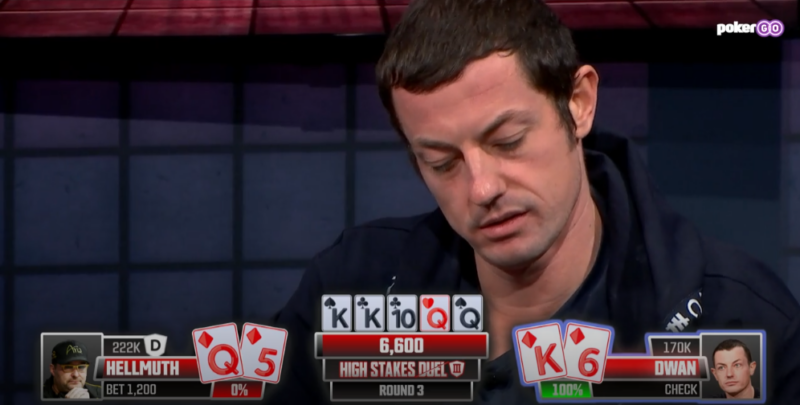
In order to be bluffing here, Dwan would have had to play his hand in a very odd way, and so far in the match, he had been pretty straight-forward. Dwan has very few, if any, bluffs here.
If Hellmuth knows all this — and from my experience with him, he probably does — then he knows that he has a one in six chance of getting a chop if he calls, and, otherwise, he’s going to lose the hand. What may appear at first glance to be a really tough fold, actually looks pretty easy once you know how to think it through like a pro.
Is this really how poker pros think?
You may be asking yourself if anyone really thinks about all this stuff during a hand. The answer is a clear yes. To a beginner or a recreational player, this thought process may seem impossible to manage in real time, but trust me, it’s absolutely real.
I’m certainly not the player these two are, and I think this way during hands myself. This is how pros pay the bills. Would I have made this fold myself? Probably. That doesn’t mean I’m half the player that Hellmuth is, but I honestly don’t think this one is that tough. Against the old Dwan from 10 years ago, this is a really tough spot, but with the way he was playing in this match, it’s a fairly safe fold.
The ability to detach yourself from the strength of your hand (I have a full house, I have to call) and think the hand through to understand your opponent’s range, is one of the things that separates the good players from the great ones. And no one does that better than Hellmuth.
The pot went to Dwan. That was never in question, but it was really Hellmuth who won the hand.
If you want to watch this hand, it starts at the 1:49:00 mark in the High Stakes Duel III Hellmuth vs. Dwan broadcast on PokerGo. You’ll need a membership, but if you’re a real fan of the game, a PokerGo membership is a steal. They do a great job with these broadcasts and you’ll learn a lot watching the best players in the world battle heads up for serious money.


